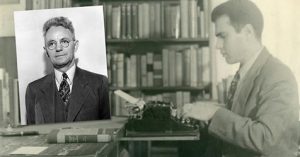Rousas John Rushdoony(1916-2001) was born in New York City to recently arrived Armenian immigrants who had fled the Turkish massacres of 1915-1916. Within weeks his parents moved to Kingsburg, California, where his father founded an Armenian-speaking Presbyterian church. He spent his boyhood, save for a time when his father was a pastor in Detroit, Michigan, on the family farm in Kingsburg.
Rushdoony graduated from the University of California at Berkeley with a B.A. in English in 1938 and an M.A. in education in 1940. He attended Pacific School of Religion, a Congregational and Methodist seminary near the Berkeley campus, and graduated in 1944. He was ordained that year by the Presbyterian Church, USA and was a missionary to the Paiute and Shoshone Indians on the Duck Valley Indian Reservation in a remote area of Nevada for eight and a half years.
In 1953 Rushdoony took a pastorate in Santa Cruz, California, a small retirement town on the ocean. He left the PCUSA in 1958 and joined the Orthodox Presbyterian Church, bringing into it another church in Santa Cruz. While in Santa Cruz he published By What Standard? an analysis of the thinking of Cornelius Van Til, who argued that the Christian must not base his thinking on autonomous human reason, but rather on self-consciously Scriptural grounds. Van Til was a professor of religion, but Rushdoony expanded Van Til's "presuppositional" thinking to all of life and thought.Rushdoony's writings therefore cover a broad spectrum of subjects because he believed in rethinking all areas of life in terms of the Word of God. These areas included theological and Biblical studies as well as history, education, law, science, philosophy, psychology, economics, and epistemology.
By the mid-1950's Rushdoony had also firmly adopted a post millennial eschatology, which gave his writings a characteristically optimistic perspective. During his pastoral years in Santa Cruz he published Intellectual Schizophrenia and finished The Messianic Character of American Education. These two books stirred a great deal of interest in the establishment of Christian schools. Later, in the 1970's and 80's, when Christian and home schools and parental control of children's education was challenged, Rushdoony frequently appeared around the U.S. as an expert defense witness on behalf of churches, schools, and parents.
In 1962 Rushdoony retired from the full-time pastorate and became a researcher and writer, first for the William Volker Fund and then with its spin-off, the Center for American Studies, before working on The One and the Many on a research grant. This book examined the necessity of a Trinitarian approach to the philosophical tension between unity or diversity as ultimate.
In 1965 Rushdoony founded Chalcedon, a Christian educational think-tank. His own personal monthly newsletter eventually developed into the Chalcedon Report, a monthly magazine.
In 1974 one of the last major aspects of Rushdoony's thought was published with the first volume of The Institutes of Biblical Law. In this volume he advocated the applicability of Biblical Law. In doing so, Rushdoony distinguished between justification, God's declaration of our righteousness on the merits of Christ's atonement which is by grace and sanctification, which is the believer's growth in grace. Sanctification, he held, was to be oriented around greater obedience to the Word of God. A believer in covenant theology,Rushdoony held Old and New Testament to be binding except where Christ's person and work clearly superseded the old covenant. Rushdoony's work on Biblical law gave rise to the theonomy, or theonomic (literally "law of God") movement, though he personally used that term less frequently than others, preferring to refer to "Biblical law" or "the law of God."
Rushdoony's optimistic eschatology, combined with his belief in the Lordship of Christ, Van Tillian persuppositional thinking and particularly his affirmation of Biblical law gave rise to what he termed "Christian reconstructionism," the idea that Christianity must proclaim not only personal renewal in the gospel, but God's requirements for every area of life and thought in personal, social, economic and cultural settings. Never an organized movement but rather a perspective on Christian duty, the term "Christian reconstruction" was used by others with differing approaches to its meaning.
In later years, Rushdoony wrote many works, some yet to be published. He also published several commentaries and published his Systematic Theology in two volumes.


1 comment for “About RJ Rushdoony”